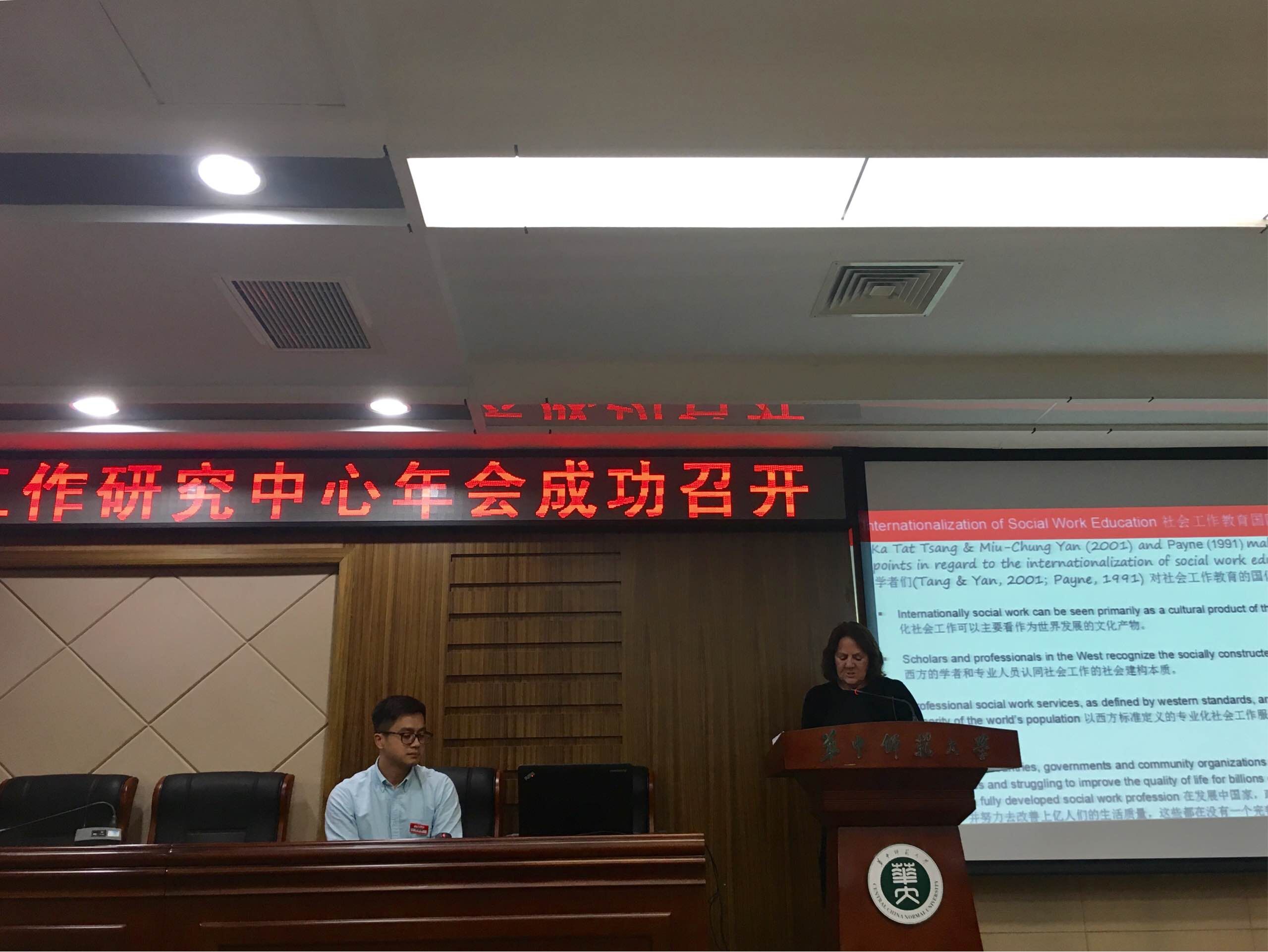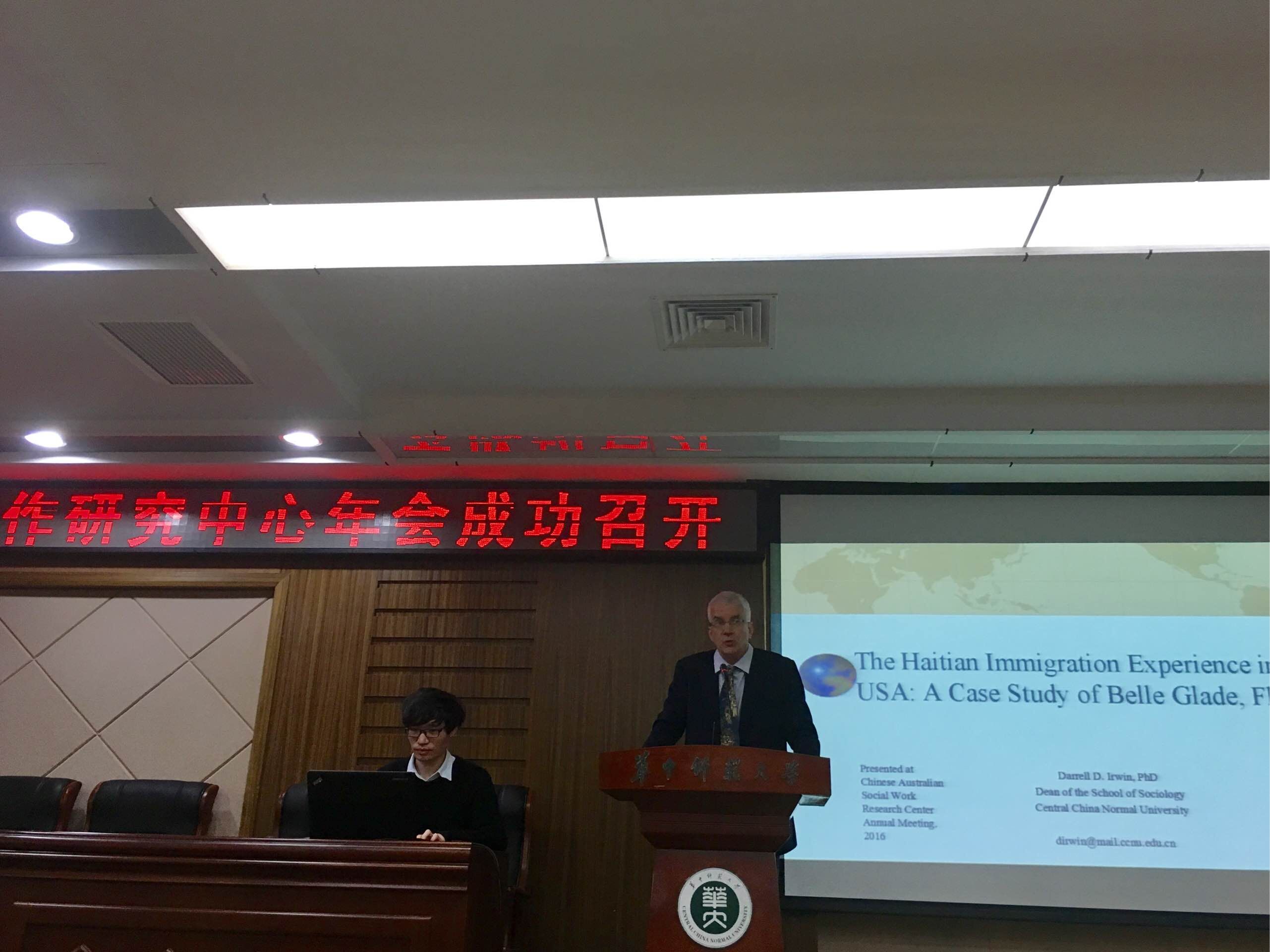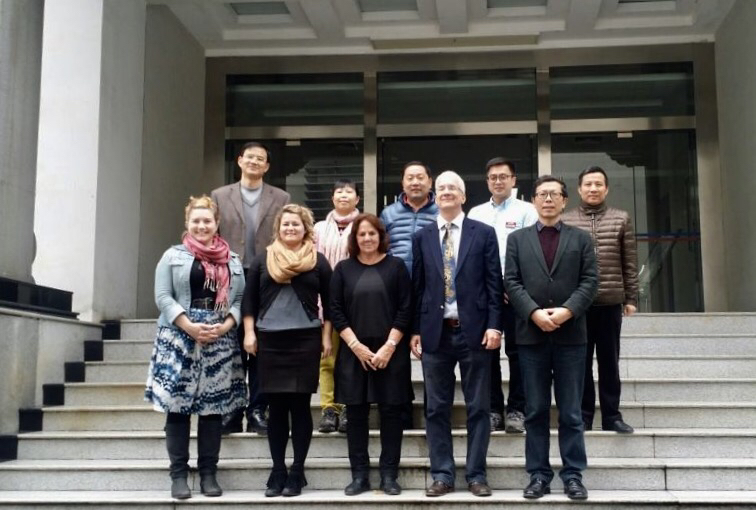The 2nd Chinese Australian Social Work Research Center Annual Meeting was held in the afternoon of November 8, 2016, at the first floor of Yifu center. Prof. Lynne Briggs, Dean of School of Human Services and Social Work of Griffith University, and Dr. Liang Jianqiang, Dr. Jess O’Reilly, and Dr. Jemma Venables attended the meeting on behalf of Griffith University. Prof. Darrell Irwin, Dean of School of Sociology, CCNU, Mr. Wang Jiping, Party Secretary of School of Sociology, Vice Dean Wan Rende, Deputy Secretary Xue Pingjun, Prof. Yang Shengyong, Prof. Zhu Pingyan, Prof. Li Xueyan attended the meeting on behalf of School of Sociology, CCNU, together with other teachers and students from School of Sociology.
Prof. Wan Rende hosted the meeting and introduced the guests first, and after the group photo, Prof. Lynne Briggs and Prof. Darrell Irwin began the meeting by addressing the keynote speeches on Key Social Work Policies and Roles of the Social Work Professional.
Prof. Briggs began the keynote speech with the topic of “Offering Social Work Education in China”. She introduced her research areas and shared her ideas on international social work education. Since the CCNU-Griffith undergraduate social work program officially started in 2012, a total number of 28 CCNU students have been sent to study at Griffith university, expecting to get both degrees from CCNU and Griffith. Prof. Briggs said the CCNU-Griffith undergraduate social work program is based on capacity building, and aims to help build CCNU faculty’s social work teaching ability through integrating the Griffith course contents and interacting with Griffith faculty. It also aims to promote the academic and student exchange between two universities, and enhance social work education in the context of internationalization. And with the establishment of Chinese Australian Social Work Research Center, Prof. Briggs believed Griffith and CCNU could have further collaboration in social work education and policy research.
Prof. Darrell Irwin followed Prof. Briggs’ speech by addressing issues on the Haitian immigration experience in the USA, using the case study of Belle Glade, Florida as an example. He introduced the history of how Haitian refugees settled in Belle Glade, many of whom would become sugar cane cutters. Journalistic accounts of Belle Glade described the labor force of sugar cane cutters as a system of modern day slavery: the process of sugar cane cutting by Haitian refugees often extends beyond the work site or labor market to include controlling workers' time and space to an extent that approximates conditions of slavery or imprisonment, creating what sociologists call total institutions. Prof. Irwin shared his own experience of providing social service for Haitian refugees in Belle Glade back in 1981, and explained to the audience the US government’s policy toward the Haitian refugees,which was referred to as the Cuban-Haitian Entrant Act. He also witnessed the unique Haitian culture and how it first adapted to American culture and became part of it.
The two keynote speeches were followed by field reports from Griffith faculty and initial CASWRC grantees. Dr. Liang Jianqiang from Griffith was the first speaker in this round. As a lecturer at Griffith University, Dr. Liang got his BSW degree from Jilin University, his MSW degree in US, and his Ph.D. degree from Hong Kong. He shared his personal growth as a social work professional in the past few years, and how he became increasingly attached to social work profession when he witnessed China’s transformation in both economic and social areas. He also shared a video of interview he conducted back in Griffith for the CCNU students who studied there, when they talked about their growth and reflections of their time spent at Griffith. Dr. Liang believed the “second-generation” Chinese social work students studying overseas are more independent and have a more clear idea of what they want. He expected to further explore the topic of how Chinese social work students changed in the context of international social work education.
Prof. Yang Shengyong presented a report on how social work can help new generation of migrant workers’ social integration. He mainly studied migrant workers who were under 36 years old, and compared to the previous generation, they have a lot of new characteristics. He studied their social integration problems through four aspects, i.e., economics, social life, culture, and psychology. Prof. Yang used both quantitative and qualitative methods in his research, and discovered the problems we have to address for social work organizations and professionals as well as government facilities to promote the social integration of new generation of migrant workers.
Prof. Zhu Pingyan’s report was entitled “Intervention of Social Work Method in the Conflict between Doctors and Patients and Pressure Releasing Research of Medical Workers”. She gave a detailed report on her project, including the research background, research goals, main research contents, and latest research progress. She believed the relationship between patients and medical workers had become a serious problem in contemporary China, and we need to pay more attention to the study of this subject. She shared the five main causes for the conflict between patients and medical workers that she discovered through her research and put forward suggestions on how to deal with those conflicts according to their different causes.
As the last speaker, Dr. Li Xueyan share her report on her Research on Professional Socialization Mechanism for Social Work Major Students. Her study focused on the inner factors that influences social work students’ career choice and tried to establish a theoretical framework to explain their professional socialization.
After the four filed reports from CCNU and Griffith faculty, the 2nd CASWRC annual meeting came to a successful end.


